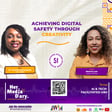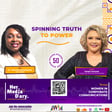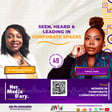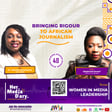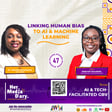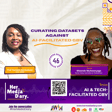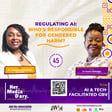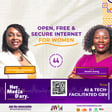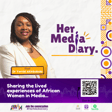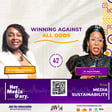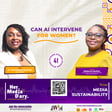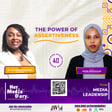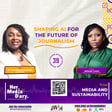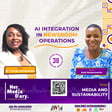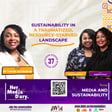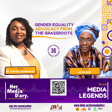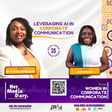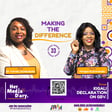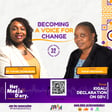Revolutionizing Morning Radio
00:00:04
Speaker
People call me Kristin Ayama Paul because I feel he is very tall and used to do very strong programs, challenge politicians, challenge CSUs, challenge people, very controversial programs. So since I've established, because they've known me for that, I have been struggling to let people understand it the model of my station. They are not used to listening to in and the morning. Those morning shows where you have your, it's very not political, but very, you know, you you get to get look at topics that are very light, very much very firm. We are not used to that kind of programs in the morning. In the morning here, when you tune into all the stations, it's very tough, very hard questions. Politicians fighting here and there.
00:00:49
Speaker
So we are trying to change the way you should listen to radio station in the morning.
Gender Equality in Media: African Women in Media's Mission
00:00:55
Speaker
And so it's been a challenge because Kerala alone is not used to those kinds of programs.
00:01:04
Speaker
Imagine a world where we have gender equality and equity in and through media. And that is our mission at African Women in Media.
Meet Dr. Yemisi and Asma James
00:01:13
Speaker
I am Dr. Yemisi Akimobola, and this is Her Media Diary, a podcast that captures the lived experiences of African women working in media industries. In this episode, I am joined by Asma James, a renowned journalist, activist, and philanthropist from Sierra Leone, with over 20 years of experience in broadcast journalism,
00:01:33
Speaker
management and advocacy for women's rights. asthma shares a journey from being a volunteer in a local radio station to rising through the ranks to become a presenter, producer, editor, station manager and ultimately establishing their own media organization which is dedicated to mostly covering issues affecting women and girls.
00:01:55
Speaker
Now throughout this series, we will be in conversation with African women who have made a name for themselves by holding vital leadership positions in various newsrooms. By inviting his voices into conversation, we hope to provide solutions to breaking down barriers faced by African women in the media industry.
Asma James: Early Life and Journalism Journey
00:02:21
Speaker
Asma, it's such a pleasure to have you on the podcast. And I'm sure you've listened to previous episodes. I know that I always like to start from way back, from my childhood, from growing up. So tell us what you know growing up was like for Asma.
00:02:36
Speaker
um So thank you very much. um I grew up in Freetown. I actually started i'm schooling in the provinces and then came back, came to Freetown when my mom died. And it was very interesting growing up because I am from very most fanatic Muslim background. So when my mom died, and my auntie, you know, took me and brought me to to Freetown and I was with her until I i started secondary school and then went back to to my sister where I grew up in the east end of Freetown. Started my primary school and then my secondary school after school. Immediately after school I went into journalism.
00:03:17
Speaker
and as a volunteer and um I've been there now growing myself and trying to put myself together professionally. So um I must say it's a bit of sweets growing up and did not actually enjoy growing up but then because you know when someone is you are in a foster home where someone else that is not your biological people or parents you know and but it's all the same I grew up and I try to give me the best and here I am today I own a whole media house. I want to go back a bit you mentioned there that your mom your mom died and when you were quite young tell us more about that and what how that's
00:04:02
Speaker
Well, what was your mom like, first of all, and how how did that shape
Heritage and Identity: A Personal Reflection
00:04:06
Speaker
you? OK, I can't quite remember because my mom um but I was six when my mom died. and And so I knew I was with my sisters, my mom, my dad. And then um she died by road accidents from Freetown to where we were in one of the provinces in the southern part of f frit of Sierra Leone. But the few moments I had with her, you know she She's actually from Egypt and she was very keen on us speaking Arabic so that is all I can remember and then the food Egypt and food she used to make so you know when we came back when my daddy wanted us to speak his own mother tongue or mother language. But then my mom was also there wanting us to have that opportunity. And then she made sure she gave us the best of Egyptian food. You can remember there is a particular food that's wrapped rice into something like cabbage or these garden eggs. and these garden eggs yeah so that's the only thing I can remember about her because that's what she always prepared for us and lots of garlic and so with this small small arabic when you speak bad arabic she will tell you she will always correct you so but ever since she died we ate everything with our main food called cassava leaves yeah yeah and so your mom was Egyptian your dad is from Sierra Leone yeah yes has that shaped your identity in any way
00:05:38
Speaker
Not really, so I am more connected to Sierra Leone.
Navigating Identity and Ethnicity in Sierra Leone
00:05:41
Speaker
I mean, but as you know, people always want to know my name is actually an asthma and you cannot find lots of people. It's it's an Arabic name. And then the James is actually my husband's name now. But then so when I call my name, it's very difficult to identify, you know, back here in Sierra Leone, it is very easy to identify people by their names, by their but By the way, they will tell you where you're from by your name. But then when I call my name, it's very difficult to identify me with different types until I started. I mean, when I speak one of the the major types language, it's the main day.
00:06:21
Speaker
You speak Mende because but when you see me, i'm I'm just mixed. You can't really identify me where I'm from. But then, um and then as as you know, we're here. My my my dad, too, we are more on our father's side until about three, four years ago when I first visited Egypt and then I've been there quite a few times to meet my you know my mother's sisters and brothers that are still alive in Egypt.
00:06:48
Speaker
It's interesting what you say there about kind of name identity and then physical appearances.
Balancing Tradition and Advocacy
00:06:54
Speaker
yeah and Because I have a friend who he's, I mean, in Nigeria, I don't know how much you know about the kind of name politics of Nigeria. So each tribe obviously has their different names and stuff. And whilst he's Yoruba, his kids mostly have like Igbo names, right? And it's not because his wife is Igbo, it's because he just loves those names. And then they have Yoruba surname. So That's always very interesting. And then with me, people always say, oh, you don't look Yoruba, you look Igbo, or you look South African. Like, Ethiopian. You look South African. So if it's in Nigeria, you look Igbo, if it's somewhere else, you look South African, or you look Ethiopian, and all that.
00:07:37
Speaker
You said you moved then with your auntie. Yes, so and my mom died. So someone took me. My mother's friend actually took me and got me to um to Freetown Capital. And I've been here ever since I go to the village. I'm very traditional. I believe in all the rights of being a traditional woman. So but yes ever since we I mean, I came back and grew up in Freetown.
00:08:02
Speaker
Tell me more about that. You said you're very traditional and believed in the traditional rights of being a woman. What does that mean? um What do I say? So, you know, we have all these things going on. I just believe that if you're from somewhere, so in a village or in a particular area, and you have your society to go through, whatever you have to go through, if you have to be this, to be a woman, even those people sometimes say, even though you... advocate, you fight for women, you're a women's right, you're this, you're very, very traditional. I say, I'm very, I hold certain traditions very sacred and what I'm very, I don't put it on people's face. I don't, like, you have to believe in what I believe in, but then I'm very mixed. I believe, I don't believe in what my instincts
00:08:53
Speaker
says I should believe it. And then so that's why I said I'm very traditional. and So I go to my people a lot. I visit them and whatever is in the village or in anything to do, if I'm there, I participate. So that's why I said I'm i'm very traditional. Yeah, and I fully appreciate that because I think we all we often assume that if we are gender advocates, then that means therefore we are we we do not value tradition or we do not value certain aspects of our culture.
00:09:22
Speaker
And actually they can coexist, right? Yes. How do you navigate that? Like trying to maintain certain traditions that in one respect, some people could take a more detailed eye on and see some inequalities in, but in another respect to something that you really value.
FGM: Advocacy for Respect and Choice
00:09:40
Speaker
So how do you as a gender advocates navigate that personally? And there's no wrong or right answer here, because like you said,
00:09:47
Speaker
is all about individual choice. And I think that's the key thing there is really is is that choice. Yes. So I have tried to keep my opinion about um things that many advocates or people see as something that should, so let's say take FGM for example. I have never ever made my position clear on FGM.
00:10:09
Speaker
I mean, I have had organizations support me, support whatever I do, that believes that FGN should be banned. And I always say I have my own beliefs and I have my own, you know, like you said, what you believe in.
00:10:24
Speaker
So I don't usually, I mean i think um publicly this is my first time of even talking about giving an example of FGM. So we have FGM, we have the LGBTQ that is on now. So I believe in whatever you want to do, you can do.
00:10:43
Speaker
I have a friend who's organization is supporting me say, okay, you you think you can advocate or you not advocate, but you cannot um say anything about FGM. I said, I will say when the time comes, but I believe in the tradition of GM and I believe the advocates or the messengers are too harsh in advocating in something that I believe in that you should we should have a negotiation on. And so I have tried not to make, because the campaigners are really,
00:11:12
Speaker
non-compromising. And so I try to keep myself away from the from the whole issue of what to say, whether to ban, whether to eliminate. twitter So in my only two ways, with the education I have, I educate my people.
00:11:27
Speaker
and I go with what the government says that you have to ah under 18 is a crime. And that I believe in under 18. But if I am old enough to do what I want to do with my myself, just as the way and people say if it's my equality, it's my life to be what I want to be.
00:11:44
Speaker
So how do I balance it? I have tried to keep away from the from the whole discussion because of the fierceness of the campaigners of, not that I don't want to, but if I believe, you say what you want to say, but if I believe in what I believe in, I mean, this is what I believe in. And now my position on it, I believe in a gym, but in a very respectful way. And I campaign or I talk. the traditional people on how to go about it. So it's not because I campaign for the rights of women and girls, or I want the girls to get the best, means I don't have certain but cultural values, and I hold very dear or secret to my heart, and a journey's one. So I tell people the conversation has to be respectful.
00:12:28
Speaker
I don't care what they say in the international scene. I don't care what they say. Who says it? Well, this is what I believe in. And I believe we have to be respectful in talking about that and in negotiating. So campaigners lead we need to, like I said, be respectful. Respect is there. Yeah. Yeah. I mean, but obviously the reason why campaigners campaign against FGM is that it's seen as a form of unnecessary violence on the bodies of women and girls, right? But your argument is that actually, yes, at a certain age, it can be considered a crime, but once you're an adult and you choose to do it, you should be allowed to choose to do it. Yeah. So let me challenge you a little bit, right? And and say, and what if, because
00:13:15
Speaker
Part of our choice making is our choice in terms of what we want, but then also it's also about things we've been brought up to believe are true, right, and appropriate. Okay. And I think, again, it's all all down to choice. So there's an element in which choice is choice, and this element with choice is kind of conditioned choice.
00:13:37
Speaker
So how, but in in your kind of line of arguments of respectful conversations and all that, how would you respond to campaigners that kind of draw out that argument? So like I said, and I maintain, but I still believe in what I say, below 18 is.
00:13:53
Speaker
totally you cannot dare to do whatever with the whole tradition and you don't have to. But then for me we have total balance, total elimination, so you have to look at different aspects to the whole campaign. So we have We have traditions and we have people believe in those traditions. Before when I was 10, 15, you cannot even mention the water chain in our society bundle because it was seem to be very thickly.
00:14:26
Speaker
But now you go on the internet, you see everything is on the internet. People talk about what they believe or what they think they know and what they think they don't know. For me, the conversation should start out after 18. I mean, it's something that should eventually die down with time because if 10, 15 years ago, we can't even say the word bundle, but now we say it.
00:14:47
Speaker
and means in the next 10 to 15 years is something that by nature, by the way things are, by how things are going, it will die down. But for now, I mean, we we start the conversation below 18 or whatever age you consider adulthood.
00:15:07
Speaker
I mean, if I am old enough to say I want to add boobs to my boobs, I know it has its medical, and whatever the medical people believe in. I mean, so as old as I am now, I want to say my nose. I don't like my nose. I want to make my nose the way I want to make. Who are you to tell me now?
00:15:25
Speaker
I mean, if I want to reduce my boobs to say, this is too much. Who are you to tell me? No. So at 40, I want to do the same thing to them. I don't need my cleats. I want to once to remove you. Who are you to say, no, it's total elimination, total bad, because it's hard. I mean, even doctors doing opticians to have babies out do something and the mother would die. The baby would die. So this story about andga all about this theory is about what people believe in is just completely different from my own side. As for me, the negotiation should start. Don't dare do anything to someone below 18. Let her be enough to say, I should be able to choose what I want to choose for myself.
00:16:08
Speaker
So that has been my, so I have not kind started the campaign. I have not, I don't comment on that publicly yet. But for the sake of this conversation, this is what I believe in. And I believe it's too aggressive the way the campaigners are. And you cannot, I mean, even if what you say, what you do, the practice is still on.
00:16:29
Speaker
So I've been able to, I went to my husband's village, there was a time I went and I told them, if you you go through the society, so the period of the society was about to, you know. the same so I said to them, if anybody below 18 is in that ah bush or whatever they call it, I will call the police. But if people that genuinely want to do it are old enough to do it, then I will support you. And I went there and I saw that yeah at that particular time, there was no underage in that ceremony.
00:17:06
Speaker
So guys, pay me to take this time out to introduce you to our platform called Awum Learning. Awum Learning is an amazing flagship learning site created by us at African Women in Media to empower journalists, media producers and anybody interested in media and making high quality and accessible content.
00:17:29
Speaker
On our learning, we cover everything from media ethics and investigative journalism to digital storytelling and gender-sensitive reporting. These courses are designed by experts in the field and tailored especially for the African context. It's super easy to navigate.
Introducing Awum: Empowering Journalists
00:17:45
Speaker
Just head over to www.ourlearning.com www.arumlearning.com to enroll and join over 2000 media professionals who have leveled up their careers with ARUM Learning. Whether you're a seasoned professional or just starting out, give ARUM Learning a try. There's something for everyone.
00:18:13
Speaker
Your core argument is that actually there should be an option of choice at an age where you're considered to be old enough to give consent to a practice, right?
Global Narratives versus Local Advocacy
00:18:26
Speaker
And obviously there'll be lots of people who i have different and points to that. But this is, I mean, this this podcast really is about your story. And I'll be interested to know more about how, you and because your advocacy for women's rights and social justice is very well known globally, right? yeah So based on your experiences and and the challenges that you experience, they see women's area
00:18:50
Speaker
having How does that feel fuel your efforts? And then particularly when you're trying to balance a global narrative and kind of it a collective perspective on any issue, whether it's FGM or whatever, how do you balance your own opinions?
00:19:07
Speaker
within that context of it, you know especially as somebody in this space, yourself advocacy for women's rights. So I have done that with the best of my, that is why I said I've never made my voice. I have never made any position.
00:19:23
Speaker
even when the body is responsible for that, invites me to on different things I don't and I have never met myself. Because the things I advocate about more, you know, is rape and you have rights, that's your leadership, and women's leadership and girls giving them access to go to school even if they are pregnant.
00:19:47
Speaker
um So the issues about rape is issues about, um so I did a campaign on Black Tuesday, which was very successful and it led to policy changes in Sierra Leone. And um we have not really had a very, very strong um issue. I mean, campaigners are there to say this is wrong, but we have not that would jeopardize what I believe in.
00:20:12
Speaker
and the global analysis of the AGM. So I go about, i do I do campaigns that I believe in, like with sexual penetration of of young girls is what i I hold very dear that I campaign strongly um against and I make sure i I give in my all. So the issues though around this one that will just, I don't know why it's set a stage,
00:20:38
Speaker
In this conversation, I'm not sure how. You brought it up. I didn't know about your opinion. Yeah, I know. I know. It's a drug paper. So you you pursued you pursued the the i the traditional woman. That is why I came up. But yes, um it's it has never conflicted in any way. I campaign my campaign and leave those issues ah aside for for now. Yeah. Do you feel silenced? No.
00:21:08
Speaker
I don't, not public, public, but then with sponsors, with people that organizations, we argue, they know my position. And so, yeah, I don't feel silent because if I want to talk, i when I'm ready or I brought it up now, if I want to, good.
00:21:26
Speaker
my position on this, I win. So I don't feel silenced. I don't feel scared. I don't feel silenced because I believe at 18, above 18, I mean, I should be able to do. I have had friends who've done that after secondary school, who've done that. No, no, I think I need to do this. I need done it and very successful one and nothing happened. So I feel very, very not silent at
From Volunteer to Media Leader
00:21:53
Speaker
And you got i mean beyond advocacy and women's rights, you you were a station manager. Are you still a station manager at Radio Democracy? No, I am not. So like I said, um I started at Radio Democracy as a volunteer. I had just from secondary school, I was waiting for my results and had announcements and then I wrote an application and I went to 96.2 then and then I was standing, lots of people were standing and we were talking and we laughed. and So the the station was owned by people that were blind. So they came and said, who just spoke? And then everybody was silent. I spoke and then he said, you have a voice, let's try it. So I started um as volunteer and then the opportunity came for video democracy. And then I went to the video democracy. I was there, went through the ones.
00:22:41
Speaker
from volunteer to freelance, to reporter, to presenter, to producer, editor of the day and later station manager. I was there for over two decades and I was station manager for 12 to 15 years and two years ago I left and established my own entity which is actually the asthma gyms network that has three components the asthma gyms foundation which mentor girls the girls plus which advocates for sexual and productive rights of women and girls and then the radio which is called rise radio now which is i'm the founder but then we dedicate 60 percent of the air time to women and girls issues young people innovation so this is what i have been doing in the last
00:23:29
Speaker
so we Okay, so you're finding yourself in media was almost accidental, would you say? Yes, it was. Yeah, but what was your journey like then? when you I mean, you said you were there from that accidental discovery 20 years later, right? You you rose up the ranks. Reflect on those early years and kind of that that's experience.
00:23:51
Speaker
um So I must say I had the best time and in broadcasting and that is why I stayed for so long. um so radio democracy is one of, and it remains the station that you go to when you want to get to talk about democracy, good governance, and human rights. So I maintain that mantra of the station. And so we had a woman, a station manager. We all admired her because she came in at the time when Sarah Lewin was struggling with democracy and the station was established. No one knew where the station was. or It was actually at the ECOMOC base when we had
00:24:30
Speaker
war when the soldiers overthrew the democratic elected government. So when it came back, when we had democracy now, governments came back, they handed the station over to civil society. So it was civil society owned, reduced the shop. At what point were you with this registration? Was it during the conflict? No, no. So just when the post-conflict, when they came back from where they were hiding, and then I joined them. And I had the best time, like I said, because there were a few radio stations, and the station had its credibility that you have to listen. I mean, video democracy, you just have to, even as we speak in the morning, you just have to listen to video democracy with the very beautiful program.
00:25:14
Speaker
Yeah, but what was it thinking about there, kind of how they started out and then during the time when you're working there, well you know how did that history of the conflict drive behind the station shape the ethos and how did you influence you know the environment there as well?
00:25:33
Speaker
so yeah so like i and i'm saying So because everybody had to listen to redo democracy, and then the station manager was a woman, so she gave us all the support, all the opportunities. Many women were working there, and then so we maintained what the station was established for. And so in Sierra Leone, this space is male-dominated, and most of the media houses are owned by men.
00:25:58
Speaker
and privately too. So, radio democracy is unique because it's owned by civil society. Different civil society organizations are members of radio democracies. So, we maintain what it was established for. So, I enjoyed every bit of it until I retired two years ago, actually, um when I left the station because I feel like I wanted to do mine and want to just grow. You cannot be in this place for over 20 years and you're still there, still doing the same thing, even though I'm still doing the same thing but different things I established and now I've given this my entity to young people managing it.
00:26:41
Speaker
whilst I look or do other things just to complement the
Challenges in Media and Advocacy
00:26:45
Speaker
station. But I've been, it's been a wonderful journey when I was at Radio Democracy. Many people place different things in their work of place because they are women. I have been very, my role is hard to sit at the table and I've enjoyed and and I maintain my integrity as a station manager until I left three years ago.
00:27:09
Speaker
Okay, so you left to set up your own kind of organization, the media arm. How easy has that been? What's been the journey in trying to establish your thing? It's been very not easy, because even to do program, there's no need to be people. i mean People call me Kristin Amapo, because I feel it's very tough. I used to do very strong programs, challenge politicians, challenge CSUs, challenge people, very controversial programs.
00:27:41
Speaker
So since I've established, because they've known me for that, I have been struggling to let people understand the model of my station, of this, my new entity. it' so We are not used to listening to in the morning, not like you have the analogy, and those morning shows where you have your, um it's very not political, but very, you know, you you get to get look at topics that are very light, very much, very firm. We are not used to that kind of of of programs in the morning here. When you tune in to all the stations, it's very tough, very hard questions, politicians fighting here and there. So we are trying to let people
00:28:21
Speaker
and To change the way you should listen to radio station station in the morning And so it's been challenged because we are not used to it alone It's not used to those kinds of programs in the morning and when I attempted to do like a light-headed program people will say ah No, this is not for you. You have to come back. You have to challenge you have to go but on the whole it's I mean, it's been wonderful because the people the set of people I established the radio for are really enjoying when I'm in their production meeting is completely different with all these jazzy and nowadays production on awful issues not like when I used to like go talk go hard on on issues
00:29:05
Speaker
But then um we're trying to let people understand that you don't need to listen to politicians arguing the same thing. I've been saying that, doing that for the last 20 years. Nothing has changed. It's the same thing. They will come when they are empowered. They will come, they will say this and they will be in opposition. It's the same thing going on on. So listen to us in the morning and just get a very light mind as you go along with your with with your day.
00:29:30
Speaker
So in terms of your own advocacy now, um so the your foundation and your work in empowering women and girls, how did you arrive at that? Because obviously you talked about your journey, accidental discovery into radio, right? But how did you get to the point of this advocacy for women and girls? What led
Advocacy and Mentorship: A Personal Mission
00:29:50
Speaker
Okay, so, um of course, i I had a trusted voice. and And so I took advantage of that. And so lots of young people look up to you, they will send you messages, they will want to mentor me. So that's how I started the foundation. The foundation, so I start time to time, I meet with them once a week, I meet with, I mentor them, I take them to their school. And then um with the ah full advocacy was about five years ago when A young girl was brutally raped in her innos, and a spinal cord got broken. And that's how I really got into. And then a friend of mine called me to say, you have to see this little girl. This jigsaw girl must get justice. And we need people to now understand that um sexual penetration of a minor is a crime. And every day, every week on on the news, we do we have these 50-year-old men penetrating through here.
00:30:50
Speaker
50, 60-year-old men penetrating very young girls. And then I said, no, and someone needs to hear and something needs to be done. So that's how I came into advocacy. We did a Black Tuesday on that straight through Tuesday, both locally and internationally, and it was recognized. And we, I mean, the the advocacy for women, women, but ah especially girls, you know, now touched my heart. So I've been doing that ever since. Tell me more about the Black Tuesday movement.
The Black Tuesday Movement: Fighting Sexual Violence
00:31:20
Speaker
So um there was a little girl, by then she was four or five, um was raped by sexually penetrated by her uncle, and then she was in the hospital for receiving treatment because a spinal cord was broken. And then, like I said, a friend of mine, who was the president of lawyers, women lawyers, female lawyers in Sierra Leone,
00:31:44
Speaker
you know so I had to visit and this young girl she was in the hospital she can't talk all these tubes were you know hung over her and then I she was so so so pathetic and then I said no I thought about it on Facebook and then I asked people to now say look we have to put a day aside to let people know we use our kids to let people know that sexual penetration we it must be something that's unaccepted in society. So I asked people to wear black. I had a team and then people you know wore black on that Tuesday and we advocated and we went I mean it was huge back here in Sierra Leone.
00:32:25
Speaker
And, you know, now we have the first lady with her and sons of her girls. Again, she came with full force of her own campaign. So the awareness of rape, the awareness of sexual penetration now, all these campaigns now led to policy change. We had the special courts for rape victims. We had policy now for rape victims. Our partners, there's an organization called purposeful.
00:32:53
Speaker
supported the AJ Foundation and the Black Tuesday Movement. So the Black Tuesday Movement was a day campaign. But because purposeful came in out and believe the idea should to now be escalated, they supported and from from just a single match. So we there are now movements, it turns out to be a movement where we raise funds again,
00:33:16
Speaker
for organizations to work in for him. We supported him and we were able to raise funds to support. So it was a campaign that changed the narrative of rape and sexual penetration. materially And so when you think about the work that you've been doing, you've we've been globally
Global Recognition and Impact in Advocacy
00:33:34
Speaker
recognized, right? The BBC recognized you as one of the 100 most inspiring and influential women in the world, right? following the Black Tuesday Movement and campaign. um You also recognized as one of the 50 most influential women in Syria early on, right? um And even the president awarded you the prestigious title of Office of the Order. Oh, yeah. okay yeah right Tell me about that and receiving such accolades. What does that mean for you?
00:34:03
Speaker
It's huge for me all the hours. You know when you do something and when you're passionate about something, you don't do it for recognition. I mean because I have things I am really passionate about and I make sure I do it to the best of my ability and um sexual penetration is one of them. So um in November 2016 or so, I was I had this email from the BBC, so I thought it was spam because I would go to my emails and try to delete emails that comes in that are not related to me. And I saw that, oh, I should talk about myself on the Black Tuesday. And I did. And in the end, I was i had this email to say, oh, you have been um nominated and you have been selected to be one of the most influential women by the BBC. so
00:34:56
Speaker
I was in a party. I felt, oh, this is huge. This is huge for me. And the work I did, actually, that little girl is normal. And she suffered until she died. But she was alive when I got the award. And I said, I did it with all my hats. I had two boys then, but her situation was really pathetic and I needed he needed a voice and I gave her the voice and I made sure everyone knew about her story even though she's never alive to actually see what happened to her because when she speak they said she's oh she's a little girl but then you know little girls when they talk they actually
00:35:34
Speaker
say something truthful. So and then I advocate a lot for girls. The 50 most influential I have won that award for like four four times now. Even this year I was also recognized. And then of course by the president's sales, okay because of all what I do because the president's award people actually there's a whole committee that is set up to identify and look at people doing exceptionally well in the field of work and also I got a call and a letter to say you will be awarded this year of one of the president's award as officer of the order of the locale. It's been wonderful to receive all these accolades
00:36:17
Speaker
and also it's it's also important that means you have to maintain you have to do more even though it's something that i'm proud of it's something you cannot refuse or when you can refuse but something that makes you feel you're doing more But I always do things based on my conviction, what I believe in, and I do it to the best. If I get recognized in the end, like it's done, then that's huge for me. And all these awards and even more of the awards is something that I'm a whole secret.
00:36:52
Speaker
that kids, because by my kids already know about them, would news that their grandmother was one someone who was who was very, very influential. So I'm very dear to me. So today, like as if I knew I was in the mood, today I said, okay, I need to so just be thirsty about my my badge today, so I had to put on my badge.
00:37:19
Speaker
Well, show this badge to the camera so that we can capture it. So this is it. There you go. This is Officer of the Order of the Rocher from the President. Fantastic. Well, congratulations and thank you so much Asman for spending the last four to five minutes or so with me. and What next for you?
00:37:40
Speaker
I don't know what's going on. It's not for me, but um just establish the radio. So like I said, our broadcast is different. People are not used to it. So I'm still grooming the radio to a certain level where I would then say, OK, I'm satisfied and then try to now move into whatever God wants me to do, but I'm still in the media space. That is why I own 80% of my staff. I remain in the media, so I'm trying to maintain for now until otherwise. Brilliant. Thank you very much, Asma, for sharing your story with me. It's been a pleasure listening to you. Thank you so much, too. I'm so happy, and I follow you a lot, and I must say you inspire me a lot. Thank you. Thank you. Yes, thank you. All right.
Conclusion: Reflections and Call to Action
00:38:37
Speaker
Today's conversation with Asma James has been interesting as we got to learn about her trends and challenges while setting up and managing her own media organization after two decades of active service in broadcast industries. Now Asma's story speaks to African women out there who wish to use their voices to advocate for and amplify the marginalized voice of women and girls facing all forms of violence. As she rightly said, when you're passionate about something,
00:39:05
Speaker
You don't do it for the recognition. You do it for the impact you're going to create through it. This, she says, motivated and informed her activism and advocacy for women's sexual rights. Drop me an email at emc at AfricanWomenInMedia.com with your thoughts and let me know if you'd like to join me on an episode of this podcast.
00:39:26
Speaker
To find out more about African Women in Media and our work, visit our main website at AfricanWomenInMedia.com. And in the show notes, there is a list of organisations and resources to support you if you have experienced any of the topics we discussed today. And don't forget, join the conversation using the hashtag HerMediaDiary.
00:39:50
Speaker
Her media diary is a product of African women in media, an NGO advocating for gender equality in the media industry. And this episode was hosted by Dr. Yemisi Akimbobola, produced and edited by Blessed Udeobasi, as part of a four-episode series on women in media leadership. All music featured in this podcast is by Nana Kwabena. Thanks for listening and join us again next.

